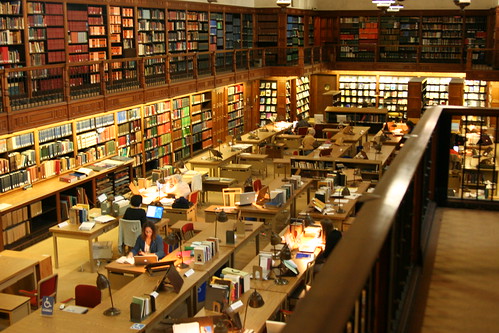
Another major question opened by the age of the electronic journal is the issue of expertise. Like the essay, the journal peer-review process is the relic of another age: an age of abundant, unbegrudging emeriti with plentiful leisure to foster the development of younger peers who had, on average, three years of training by way of a PhD. The limited number of peer-reviewers and editors responsible for the operation of the journal at any given time, is the relic of the system limited by the expense of the US Post Office, the limited social networks of the people who invented the system, and the era of fewer PhD's on the world scene. In a new era, many of the burdens of editing and curation can be more broadly distributed to both the aid of the editors and the thriving of the discipline itself.
4a) Benefiting from a wider array of input.
In the age of web 2.0, journals have the opportunity to reconsider the distribution of time and responsibility. Is peer review a top-down mentoring process for scaling up the academic ladder, or will it be reconceived as an open playing-field (a sort of open seminar for peer review rather than a two-vetted-readers-read-you)? With the aid of wikis, it becomes possible for a single text to be usefully edited by hundreds of individuals, vetting their understanding of significance, authentic fact, and argument flow. For young scholars, accreted small suggestions of other citations, references, examples, and counterexamples, from a wider array of supporters, could conceivably enhance an article on multiple levels.
4b) The opportunity to expand disciplinary boundaries.
In web 2.0 collaboration, the thinking of interdisciplinary members of the broader academy might be usefully invited. The pressure of other ideas could hypothetically encourage the discipline to take account of the findings of related sub-disciplines (invited participation from scholars in postcolonial studies for Victorian Studies issues on empire), the concerns of related fields (are economists convinced by new findings in economic history?), and the legibility of argument to the public (does this ground-breaking, relevant article on tyranny and empire actually parse to the average reader of the NYT?)
4c) The reconsideration of timelines.
In the age of web 2.0, it is also possible for a writer to continuously revise an argument over an extended period of time, even indefinitely. For the sake of scholars' multiple projects, an indefinitely revised work is probably not ideal, but extended revisions, over the course of a year, become possible and useful for the author and the discipline. An article could be published as "officially under review" in a sub-category of the journal stream, subjected to gradual wiki conversation for a year, and remain available to a reading public for the entirety of that time.
The product that would emerge at the end of a year of wiki-ratification would be very different than that at the beginning. If the author failed, in the course of wiki revision, to produce a stronger article than at the beginning, the article could be removed from the journal stream at the end of the year.
4d) Indefinite projects.
An exception to the rule against indefinite revisions might be the case of a collectively-authored, introductory textbook (editions #33-150 of Arnstein's Introduction to British History could easily be collectively rewritten over the course of 20 years by a team of collaborators). Similarly, the journal might include a wiki article on "the state of the discipline" that was collectively revised by the journal's readership, year after year, to consider the best collective knowledge of subjects of inquiry.
---
Over the next week, we're offering some tentative principles for rethinking journals by way of sparking conversation. At first, these thoughts will take the form of blog entries like this one, where visitors can add comments at the end of every note. We welcome your reactions -- especially sets of alternative principles or concerns that may have been overlooked. At the end of the week, we'll be integrating the original principles with your comments into a wiki. Wikis, as you probably know from wikipedia, are pretty good at synthesizing the opinion of a group. They're also not much harder to use than Microsoft Word. The wiki will form an evolving, multi-authored document that will have some permanence and the ability to slow-evolve to reflect the diversity of concerns and strategies on the table. The responses you offer here, the wiki, and the long-term conversation will, we hope, produce a useful overview of the diversity of opinions, offering a substantial statement on the profession for use when the CELJ next convenes live.
No comments:
Post a Comment